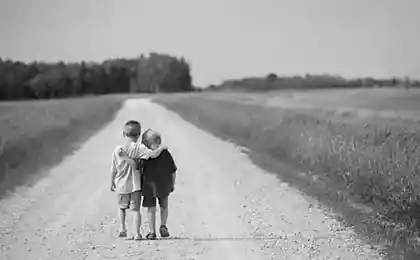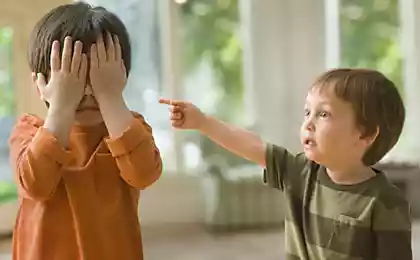465
On young and adult Tattler and informers
On young and adult Tattler and informers, people, "washing dirty linen in public," and the vigilantes. Topic "tattle tail" is complex and very ambiguous. And this is probably only the beginning of the reflection.
1. Toddlers (under 5 years), as a rule, do not know how to keep secrets, not able to restrain impulses, do not feel the boundaries, talk about each other and about others different without malice. Full of enthusiasm to tell if a reputable adult encourages those stories. It is important for children to talk about personal boundaries and it is important to show respect for their territory.
2. Children are sensitive to "correct" — "wrong", "justice" — "injustice" — react to the imbalance and immediately report it.
3. Almost all children initially speak the truth, not assuming that this "truth" can be subjective or can someone be hurt.

It is important to consider:
Abednico grows out of unhealthy competition. And from the feeling of helplessness — that I can't influence the situation himself. (but it is important to remember that there are situations that a child cannot and should not be influenced himself.).
If we notice in children budnichno — it is important to understand what is the need behind such a model. The phenomenon can be called "by name" — " is called a "Snitch". Perhaps you're upset at my brother and want to restore justice? Perhaps you think I do not see and want to help me? Maybe you want to be closer to me? you want to punish him, or want to learn how to live. to each of you comfortable?
It is important to think about the child's self-esteem, about how do we let him display his power in another way, do we teach it to defend its borders, teach you how to spravyatsya with conflicts, if he feels his importance and feels that he has a place in the system.
Sometimes adults con children, such as stewards class, imputing to them the duties to make lists of late, not do homework, not wearing the uniform. The child gets to an ethical fork — group loyalty and loyalty to leaders. the village head (and class teacher) have to care about the class and it turns out, at the same time, to be on the side of the punishing authority. If the class of the responsibilities of elders know all the disciples are warned about the consequences of their actions and understand that it's his responsibility to treat this without resentment. But here, in any case, a conflict.
Children after 10 years I know what a tattle tail and do not like snitches and don't talk about their beat, what they steal out of fear that:
1. Adult or will not support.
2. Or so emotionally involved, that it hurt.
3. That he would be considered a Snitch and will cease to respect.
Children need to build knowledge that they can count on us, when you need our help we are on their side, that their safety — physical, emotional, and the safety of others is a trait that separates the squealing from INFORMING and healthy care.
I'm for that, everything was resolved inside the system. But the system does not always ready to change. Sometimes "to Make dirty linen in public" terms "efferent" — the only way to change something. And sometimes it is a revenge system. Revenge is always the role of a victim — the wronged child. Change adults.

Child, "hovering" between the systems, living between dad and mom, grandmothers/grandfathers and worldviews of the parents is that it was everywhere to balance within these systems can begin to "knock" the mom to the dad, the grandmother on the mother... and this adult task is to agree on educational concepts, to cease to compete for the love of a child, let him feel the Love and joy with all family members. (Mother picking her child up after talking with his father (if Parents divorced), can remove stress at the child, sincerely saying — I'm glad you dad is well).
How to raise emotional intelligence in children: the 3 keys to success
Teach children to dream and not to be afraid of...
There are many concepts, telling about how that person has mounted "an inner sense of rightness". and in every situation — this "correctness" can be his. and what is right in one culture may be totally clear in another... I really believe that we have this compass that shows the direction to "Conscience". But he often fails when not safe for us. And an indicator of the maturity and inner strength — when we hold it vertical of Conscience.published
Author: Svetlana Roiz
Source: www.facebook.com/svetlanaroyz/posts/1452627141437553
1. Toddlers (under 5 years), as a rule, do not know how to keep secrets, not able to restrain impulses, do not feel the boundaries, talk about each other and about others different without malice. Full of enthusiasm to tell if a reputable adult encourages those stories. It is important for children to talk about personal boundaries and it is important to show respect for their territory.
2. Children are sensitive to "correct" — "wrong", "justice" — "injustice" — react to the imbalance and immediately report it.
3. Almost all children initially speak the truth, not assuming that this "truth" can be subjective or can someone be hurt.

It is important to consider:
- Abednico is the manifestation of passive aggression. For example, the youngest child tattles on older to avenge the possible depreciation.
- Senior tattles on Jr. to "restore justice" in education, to revenge, to reduce the weight and to regain the attention of the senior. From "informers" — there is a benefit, it is possible to provide the image — they did not knock on someone, and by someone dropping it and "lifting" of it, revenge.
- Sometimes very honest children are perfectionists talk about their classmates and teacher — genuinely wanting to improve something. They seldom lay in the action of profit for itself. Often think that care and bring balance to honestly perform the duties follow the instructions. And it is important for teachers to understand the child that he appreciates the care that values what the child wants to improve, but that he is aware of the situation. It is important to redirect the energy of the child into constructive action — to give crucial orders. But not associated with assessment of the actions of other children. And it is important to "run" in the child's mind — and how you think you can improve the situation that children did — didn't. And do you think its actions now do you help classmates or not. (But, of course, such conversations can only lead to wise and harmonious teacher. Such precisely is).
Abednico grows out of unhealthy competition. And from the feeling of helplessness — that I can't influence the situation himself. (but it is important to remember that there are situations that a child cannot and should not be influenced himself.).
If we notice in children budnichno — it is important to understand what is the need behind such a model. The phenomenon can be called "by name" — " is called a "Snitch". Perhaps you're upset at my brother and want to restore justice? Perhaps you think I do not see and want to help me? Maybe you want to be closer to me? you want to punish him, or want to learn how to live. to each of you comfortable?
It is important to think about the child's self-esteem, about how do we let him display his power in another way, do we teach it to defend its borders, teach you how to spravyatsya with conflicts, if he feels his importance and feels that he has a place in the system.
Sometimes adults con children, such as stewards class, imputing to them the duties to make lists of late, not do homework, not wearing the uniform. The child gets to an ethical fork — group loyalty and loyalty to leaders. the village head (and class teacher) have to care about the class and it turns out, at the same time, to be on the side of the punishing authority. If the class of the responsibilities of elders know all the disciples are warned about the consequences of their actions and understand that it's his responsibility to treat this without resentment. But here, in any case, a conflict.
Children after 10 years I know what a tattle tail and do not like snitches and don't talk about their beat, what they steal out of fear that:
1. Adult or will not support.
2. Or so emotionally involved, that it hurt.
3. That he would be considered a Snitch and will cease to respect.
Children need to build knowledge that they can count on us, when you need our help we are on their side, that their safety — physical, emotional, and the safety of others is a trait that separates the squealing from INFORMING and healthy care.
I'm for that, everything was resolved inside the system. But the system does not always ready to change. Sometimes "to Make dirty linen in public" terms "efferent" — the only way to change something. And sometimes it is a revenge system. Revenge is always the role of a victim — the wronged child. Change adults.

Child, "hovering" between the systems, living between dad and mom, grandmothers/grandfathers and worldviews of the parents is that it was everywhere to balance within these systems can begin to "knock" the mom to the dad, the grandmother on the mother... and this adult task is to agree on educational concepts, to cease to compete for the love of a child, let him feel the Love and joy with all family members. (Mother picking her child up after talking with his father (if Parents divorced), can remove stress at the child, sincerely saying — I'm glad you dad is well).
How to raise emotional intelligence in children: the 3 keys to success
Teach children to dream and not to be afraid of...
There are many concepts, telling about how that person has mounted "an inner sense of rightness". and in every situation — this "correctness" can be his. and what is right in one culture may be totally clear in another... I really believe that we have this compass that shows the direction to "Conscience". But he often fails when not safe for us. And an indicator of the maturity and inner strength — when we hold it vertical of Conscience.published
Author: Svetlana Roiz
Source: www.facebook.com/svetlanaroyz/posts/1452627141437553
Electric vehicles have reduced gasoline consumption
Las Vegas was entirely on clean energy alternative sources























